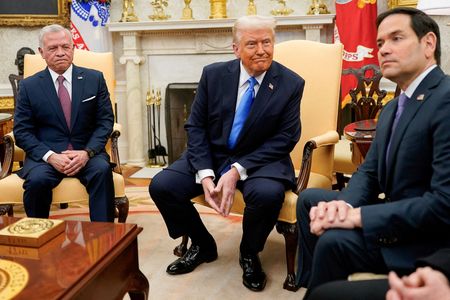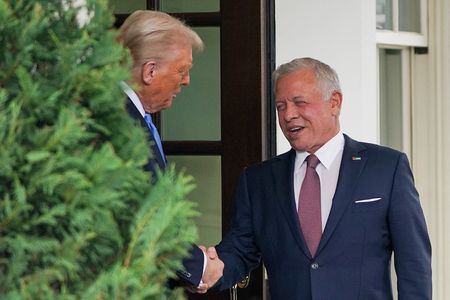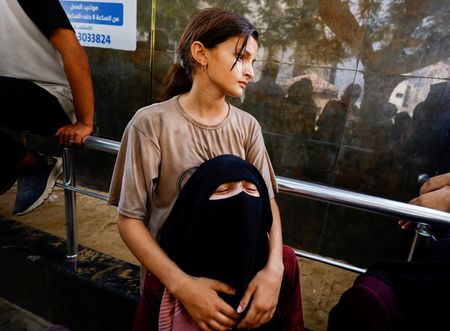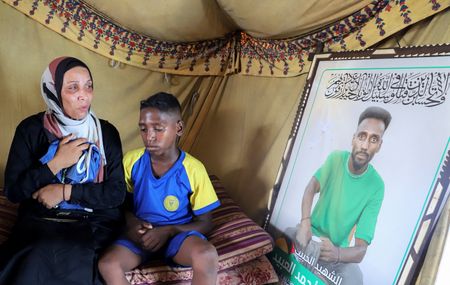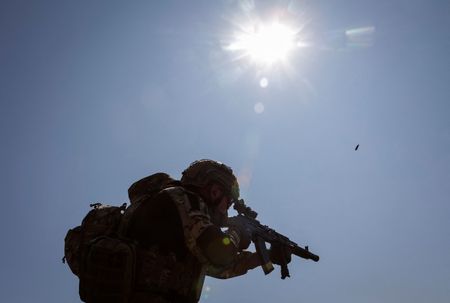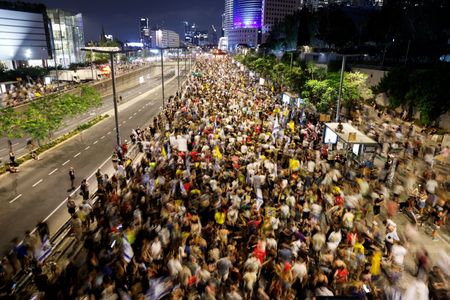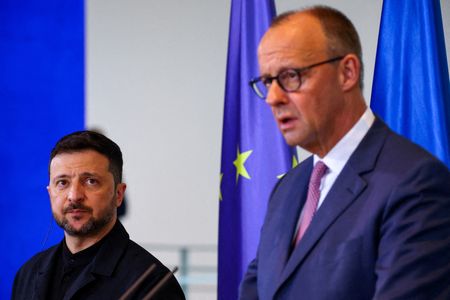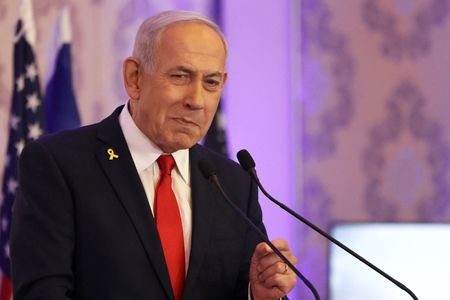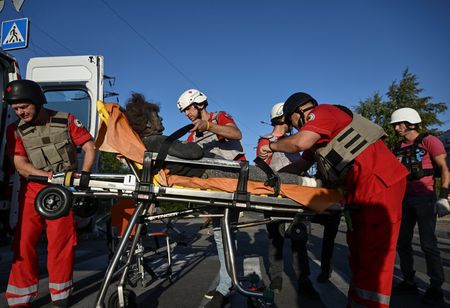By Suleiman Al-Khalidi
AMMAN (Reuters) – Millions of dollars in U.S. grants for Jordan’s largest water desalination project abruptly dried up when President Donald Trump announced sweeping cuts to foreign aid in January.
Within two months, support was flowing again, a result of diplomacy that has arguably put the pivotal Middle Eastern state on more solid financial footing than before the U.S. president’s shock move to reshape global foreign aid in January, conversations with more than 20 sources in Jordan and the United States reveal.
Jordan – which stands behind only Ukraine, Israel and Ethiopia among the largest recipients of U.S. aid globally – has won assurances from Washington that the bulk of financing worth at least $1.45 billion annually remains intact, including military and direct budgetary support, according to Reuters conversations with the sources.
Most of the sources, including Jordanian officials, diplomats, regional security officials, U.S. officials and contractors involved in U.S. aid projects asked not to be named to discuss sensitive ongoing diplomatic discussions.
Four of them said payments resumed in March to U.S. firm CDM Smith, which USAID tasked with overseeing the $6 billion Aqaba-Amman Water Desalination and Conveyance Project, seen as key to the self-sufficiency of the arid kingdom.
The United States has for decades relied on Jordan to help achieve its goals in the Middle East, including during the Iraq War and as a partner in the fight against al Qaeda in the region. Jordan hosts U.S. forces under a treaty allowing them to deploy at its bases. The CIA works closely with Amman’s intelligence services.
Although several sources said much of the $430 million annual assistance for development programs remains frozen, hitting education and health projects, Molly Hickey, a Harvard-doctoral researcher studying U.S. aid and Jordan’s political landscape, said these areas are seen as less strategically important.
“Trump has protected funding considered critical to Jordan’s stability, namely defense, water, and direct budget support,” said Hickey, citing contacts with U.S. officials that corroborate Reuters’ findings.
A U.S. State Department spokesperson confirmed Jordan’s military aid was intact, calling Jordan a strong U.S. partner with a critical role for regional security.
A decision has now been taken to continue U.S. Foreign Military Financing to all recipients, after Secretary of State Marco Rubio completed his review of foreign assistance awarded by State and USAID, the spokesperson said.
The assurances to Jordan, extended during visits by King Abdullah and Prime Minister Jafaar Hassan to Washington in recent weeks, have not previously been reported, and appear to mark a reversal of Trump’s earlier warning he could target Jordan’s aid if the country did not agree to take in large numbers of refugees under a proposal to turn Gaza into a beach resort.
In a private White House meeting in February, Trump assured King Abdullah that U.S. aid would not be used as leverage for political concessions, two U.S. and two Jordanian officials familiar with the matter told Reuters.
The State Department spokesperson declined to comment on “ongoing negotiations.” The White House said questions on the issue should be directed to State.
Senior White House aides met in recent weeks to discuss the fate of Jordan’s financing, three officials with knowledge of the situation told Reuters, concluding that the kingdom’s stability was critical to U.S. national security. There was agreement in the meetings that aid should be restructured and enhanced to directly support that goal, one of the officials said.
None of the sources described specific concessions by Jordan, instead pointing to its position as a stable ally whose longstanding peace deal with neighbour Israel and deep ties to Palestinians were a bulwark against wider Middle East conflict.
“We appreciate the U.S. economic and financial support and will continue to engage in discussions that will benefit the economic sectors of both countries,” Jordan’s Minister of State for Communications Mohammad al Momani told Reuters in response to a question about Hassan’s talks and whether Jordan’s lobbying to maintain critical aid was paying off.
ISLAMISTS OUTLAWED
A financial squeeze on Jordan does not serve U.S. interests, given the kingdom’s vulnerability to “radical influences,” said one senior Jordanian official, referring to Islamist group the Muslim Brotherhood as well as Iran’s funding of militants in the region.
Last week, Jordan outlawed the Muslim Brotherhood, a political movement that gave rise to Hamas. Jordan accuses its members of a major sabotage plot.
The plot was announced on April 15, the same day Hassan met with U.S. Secretary of State Marco Rubio. One official told Reuters the threat of political Islam and the Muslim Brotherhood was discussed at the meeting. Reuters could not establish whether they discussed banning the group.
Another senior official and a regional intelligence official said economic pressure risked unrest among a population angered by the government’s treaty with Israel and its pro-Western stance.
That view was bolstered by the foiled sabotage plot, the intelligence official said.
While Washington has moved to restore some World Food Program food projects to countries including Jordan, few of the USAID-led projects including those promoting political and economic reform have been brought back.
“Ensuring we have the right mix of programs to support U.S. national security and other core national interests of the United States requires an agile approach. We will continue to make changes as needed,” the State Department spokesperson said.
The largest component of U.S. aid to Jordan is some $850 million in direct budget support, agreed under a seven year strategic partnership signed in 2022. Government ministers had fretted in private that this money was at risk
“Eliminating that support would significantly worsen our deficit and debt burden,” former Planning Minister Wissam Rabadi said in televised remarks. “Today we face a deficit, and losing $800 million would be devastating.”
However, five of the sources, including two U.S. sources, told Reuters that Washington has now assured Amman this year’s support, due in December and already factored into the $18 billion national budget, would not be touched.
SHAKEN BY TRUMP
Shaken by Trump’s threats, Jordan has simultaneously been locking down further assistance from other allies.
It has turned to Europe, Gulf neighbours and multilateral lenders since Trump unveiled the global aid freeze in a January 20 memo, with the State Department initially offering waivers only for military aid to Egypt and Israel.
Last week, King Abdullah visited Mohammed bin Salman, crown prince of Jordan’s larger Arabian peninsula neighbour Saudi Arabia. One senior Jordanian official abreast of the discussions said Riyadh was considering a military aid package to strengthen Jordan’s defense capabilities.
Ties with Saudi Arabia have been strained in recent years, and it has not previously provided military aid. The official did not give a sense of the potential scale of the package.
The Saudi government media office and Jordan’s army spokesman did not immediately respond to requests for comment.
Two officials and a senior Western diplomat familiar with the talks with the IMF said the government was close to finalizing a sustainability agreement with the IMF to supplement its existing $1.2 billion, four-year EFF program.
The new arrangement could unlock as much as an additional $750 million in tranches, they added. The IMF declined to comment.
Other negotiations have already yielded results: 3 billion euros over three years from the European Union, announced days after Trump’s aid cuts by European Commission head Ursula von der Leyen, who cited “geopolitical shifts;” $1.1 bln in fresh financing from the World Bank and a $690 million package from the Kuwait-based Arab Fund for Economic and Social Development, both approved in April.
Domestically, Prime Minister Hassan has been rallying corporations and business leaders to contribute to a national fund, raising over $100 million to relieve pressure on government finances.
“Jordan’s economy has largely weathered the storm,” said Raad Mahmoud Al Tal, the head of economics faculty at Jordan University. The government’s lobbying “allowed it to retain the bulk of core aid and even get bigger donor packages beyond what was anticipated.”
(Reporting by Suleiman Al-Khalidi in Amman; Additional reporting by Jonathan Landay and Steve Holland in Washington; Editing by Frank Jack Daniel)

